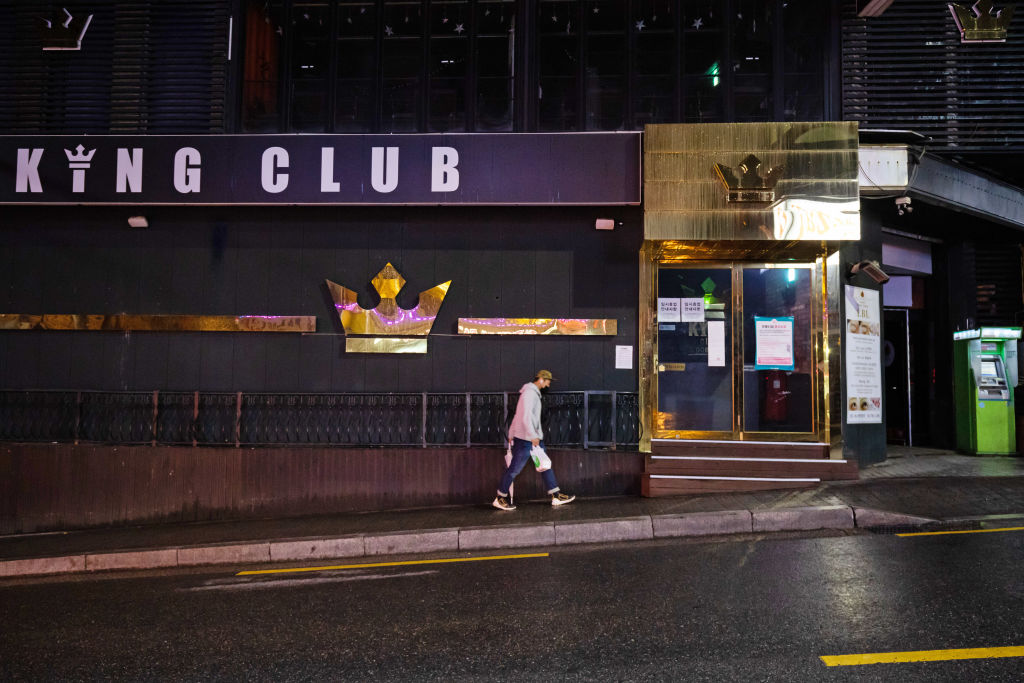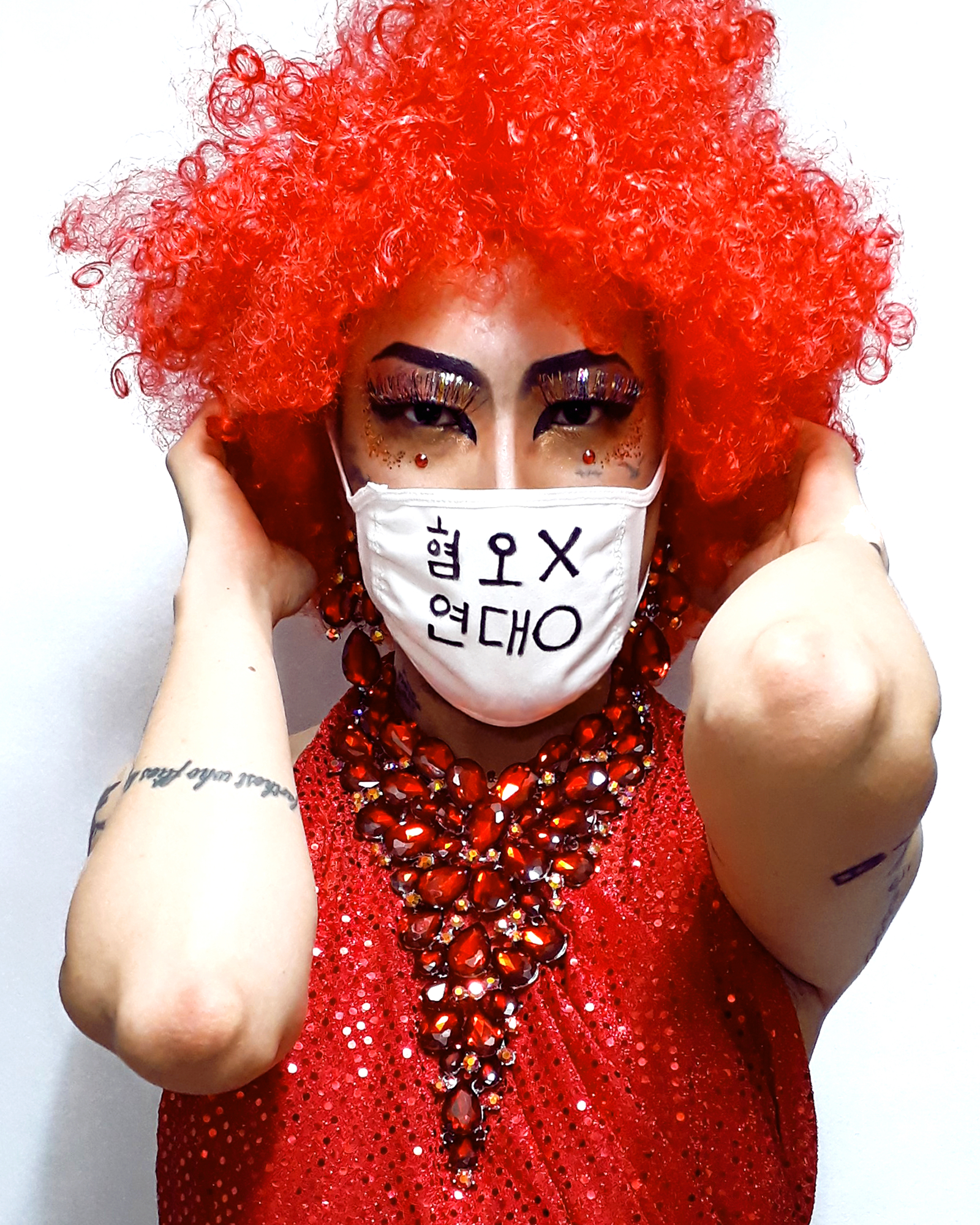
In his early 20s, after leaving business school to follow his ambition of becoming an artist and performer, Heezy Yang was drawn to an out-of-the-way area of Seoul’s Itaewon district known as Homo Hill, a longtime haven for LGBTQ people in South Korea.
There, he found a place where he could interact with others without fear of judgement or discrimination, while exploring ways to express his sexuality through art. The area is a craggy hill near a U.S. military base, where, after dark, bright signs bearing the names of clubs like Queen and Soho cast the streets in multicolored light.
Nowadays, those lights are off, the bars and nightclubs are closed and the usually buzzing streets are uncharacteristically quiet after a coronavirus cluster with more than 130 cases shined unwanted attention on the neighborhood—sparking a surge in homophobia, activists say.
The South Korean government is now trying to track down anyone who visited establishments in the neighborhood, sparking fears that the country’s efficient, aggressive system of contact tracing could lead to people being outed, and imperil the neighborhood’s status as a discreet area where LGBTQ people can be themselves.

Now a well-known drag performer and visual artist, Yang, 29, says that the area, represents a kind of openness that is impossible to find elsewhere in South Korea.
“You cannot be completely free in other areas, as free as you can be on Homo Hill,” Yang tells TIME. “Like holding hands or kissing, you can’t do that anywhere else.”
The news of the rising number of infections has weighed on him. “I worry about friends and acquaintances because not everyone has a family that supports them,” he says.
The publicity is a stark departure for an area that is normally a discreet sanctuary for LGBTQ people in South Korea—a country that ranks low among developed economies for LGBTQ acceptance, and where many choose to keep their sexual orientations private to avoid discrimination at their workplaces or from their families.
South Korea’s media began focusing on the neighborhood after public health authorities announced that a 29-year-old man who later tested positive for the coronavirus visited several establishments in the area on May 2. Authorities gathered a list of more than 5,500 people who visited clubs there. As of Thursday, they had still not managed to contact some 2,500 of them.
The timing of these new COVID-19 cases was particularly bad. South Korea officially relaxed its social distancing guidelines on May 6, and appeared to have gotten control of a coronavirus outbreak that, in late February, was the largest outside China. The country of 52 million has won plaudits abroad for its system of widespread testing and contact tracing. By late April, authorities had brought the number of new daily cases down to single digits—without having enacted a comprehensive lockdown.
The celebration was short lived. The number of daily new cases—two or three dozen early this week—is still far below the hundreds of new infections South Korea reported per day in late February and early March, but the new cluster has caused dismay by coming at a time many felt the country was getting back to normal.
Escalating the tension, all patrons of clubs in Itaewon were required to provide their names and contact information, though authorities said some details later proved false or incomplete. The uncertainty in tracking everyone down echoed the early escalation of South Korea’s outbreak, when members of a secretive religious group were accused of refusing to be tested and thereby spreading the virus—before church leaders agreed to provide a full list of members.
Due to concerns over the new momentum of the virus’s spread in South Korea, the government has delayed the opening of the new school year. Itaewon revelers have also become objects of scorn.
One newspaper, the Kukmin Ilbo, garnered criticism for articles that used language depicting gay men as promiscuous and prone to risky sexual behavior. Activists argued that the newspaper unnecessarily highlighted that the initial subject of the outbreak investigation had visited a gay club in an effort to stir up homophobia.
The South Korea office of Amnesty International condemned the article in a statement on Tuesday, saying such reporting “foments stigma and anti-LGBT sentiment.”
The situation leaves the South Korean government to strike a delicate balance. The country’s success in tackling the coronavirus has required citizens to cede a degree of privacy by allowing the government to track their movements through mobile phone data, then disclose those movements with or without consent. The government releases highly detailed information about the movements of each known coronavirus case. Authorities are now seeking a way to continue such tracking while being careful not to inadvertently disclose information that could lead to neighbors and colleagues learning an infected person visited a gay bar.
“Sexual orientation is not relevant for virus-prevention efforts, and such disclosure could violate rights to privacy. If information like that is disclosed, why would anyone come forward and admit that they visited those places?” said Kim Woo-joo, a professor in the Division of Infectious Diseases at Korea University Guro Hospital in Seoul.
Homosexuality is not illegal in South Korea, but openly gay public figures are rare.
On Tuesday, Hong Seok-chun, an actor and television personality who is credited as being South Korea’s first openly gay celebrity, publicly weighed in on the intensifying situation, posting a photo of Itaewon on Instagram and imploring anyone who has spent time in the area of late to get tested.
“Now is the time to be brave,” Hong wrote. “I, better than anyone, know the worries over outing, but right now what’s most important is the health and safety of our families and society.”
Hong is one example of how LGBTQ South Koreans are banding together. On Tuesday, to provide assistance to people in need of support, a coalition of South Korean civic groups announced the launch of a hotline for anyone who wants to be tested anonymously. “Let’s form a new community in the midst of a crisis and support each other,” the group said in a statement.
LGBTQ South Koreans who are not out to colleagues and family members, have watched with anxiety as their relatively small and discreet community suddenly garnering national scrutiny. Nightclubs with names like Trunk, H.I.M and Pink Elephant, which were previously only known to a few, are national news.
“Now these are the most famous clubs in Korea,” says Kim, a gay 30-year-old resident of Seoul, who asked that only his surname be used because he is not out to his family or employer.
Kim feels that the community has grown strong enough to withstand the crisis. “I don’t worry about those bars closing. And even if they did close, other bars and clubs would open.”
He is in favor of the government’s contact tracing program and hopes the Itaewon outbreak will be a turning point for LGBTQ Koreans. “The media’s frame for reporting on the LGBTQ community has been sensationalism,” he says. “Now is the time to take action to defend ourselves from hatred.”
Despite the current tensions, in recent years South Korea’s LGBTQ community has taken steps out of the Itaewon shadows. Compared to the start of his career, Yang, the artist and drag performer, finds more opportunities to show his work in new places and collaborate with non-LGBTQ artists.
“Things are definitely better than they were five or ten years ago. Now I can open up to people relatively more easily, most people are more open minded and don’t have any prejudice,” he says.
He feels that the ongoing backlash is a response to LGBTQ people’s growing profile. “Now we are vocal and visible, our status is higher now and we’re being talked about.”
Yang also worries that, with the climate of distrust caused by the ongoing pandemic, those gains are now in peril, saying, “I don’t want everything that we’ve achieved to go away.”
Please send tips, leads, and stories from the frontlines to virus@time.com.
More Must-Reads From TIME
- The 100 Most Influential People of 2024
- Coco Gauff Is Playing for Herself Now
- Scenes From Pro-Palestinian Encampments Across U.S. Universities
- 6 Compliments That Land Every Time
- If You're Dating Right Now , You're Brave: Column
- The AI That Could Heal a Divided Internet
- Fallout Is a Brilliant Model for the Future of Video Game Adaptations
- Want Weekly Recs on What to Watch, Read, and More? Sign Up for Worth Your Time
Contact us at letters@time.com